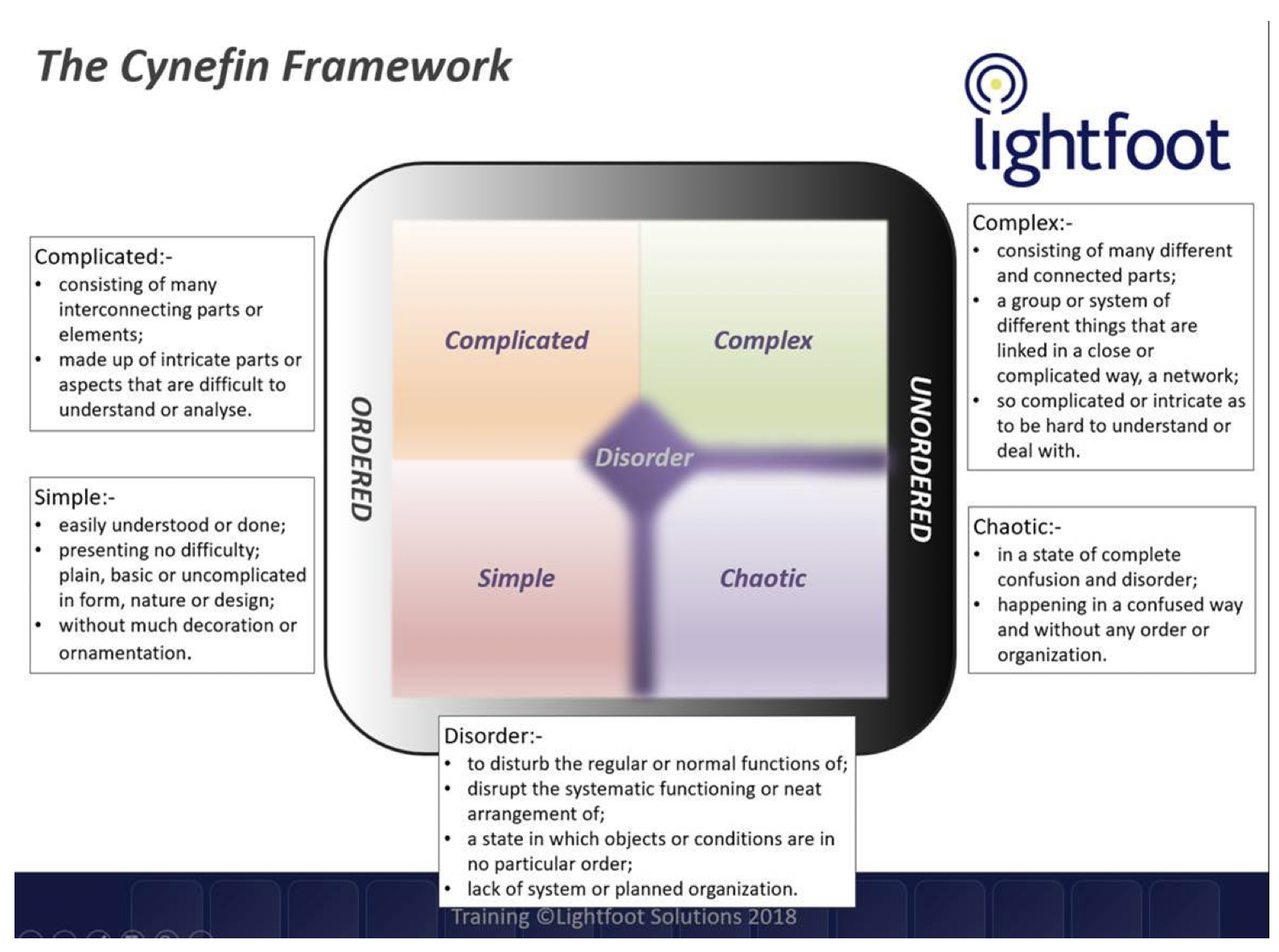“Computer says ‘So’ – Innovation and Cynefin” – first of four on this subject
18/02/2019

Some of you will remember the famous sketch in the TV series, Little Britain, where the “Computer Says No” to a prospective customer, and the frustrating time that person has in understanding why!
Well, with today’s bright and shiny “Innovative Solutions” employing so-called “Big Data” and “Artificial Intelligence” the real danger is that a user of such tools will be directed to carry out some action, and when questioned, possibly in court, the only response they’ll be able to give is “I had to do it because The Computer Says So”!
In our last blog, we looked at “Thinking Differently (and understanding)” vs “Doing Differently (without understanding)”. I’ve heard many senior executives and busy managers say, “I don’t have time to understand, just give me three alternatives, and I’ll pick one”. Presumably, the ability to pick the right one, or even to know they’re the right three in the first place, increases as one ascends the corporate ladder? Just why are these senior people so busy? We’ll look at that in a future blog.
In the previous blog, we touched on the Cynefin Framework – IBM being cited as the originator of this concept. It is a framework for understanding – understanding what type of Environment your business is operating in, and the type of Business Systems, Processes or Stages working in such Environments. It provides an understanding of which Approaches, Techniques and Tools work best in each Environment and which do not.
Apparently, Cynefin is pronounced ku-NEV-in, and is a Welsh word that signifies “the multiple factors in our environment and our experience that influence us in ways we can never fully understand.”
With the help of Bill Dettmer (Goal Systems International), we’ve developed this framework beyond its initial inception to cater for how we have seen things working in our customers’ situations. It is work in progress. Rather than explaining the structure in detail here, we’ll briefly try to bring this framework to life through some examples to highlight the 4 main Environments / Systems – let’s call them Domains – represented by the 4 boxes below.

And we’ll refer back to a previous blog where we introduced the term VUCA (Volatile, Uncertain, Complex and Ambiguous), see
We’ll use a “VUCA Score” to help determine which Domain we’re in, as sometimes it may be difficult to determine where we are.
We’ll just cover the Simple Domain in this first of four blogs, then work our way around to the rather special and exciting Chaotic Domain in subsequent blogs:
Simple Domain (Volatility = Low; Uncertainty = Low; Complexity = Low; Ambiguity = Low): For example, taking a call from a customer to change an insurance policy, or taking a call from a member of the public and passing on to the control room for despatch. Each of these is a relatively Simple Environment, with relatively low variability and low uncertainty, that can be catered for by relatively Simple Business Stages (that may be part of a potentially more Complicated Business Process or System).
Almost all good management techniques and tools work well here, and include Lean, 6-Sigma, SPC, Cause & Effect, Correlation Analysis, Logical Thinking Process, Boyd’s OODA Loop, and it is straightforward to predict forward as to what to expect in the future, and so on. Common Practice (some would call it Best Practice) can be applied derived from a common understanding of the Domain.
But note, even a Simple Domain can fall into the frenzied area labelled Disorder. For example, if you’ve planned on a certain number of resources for, say, an Environment where there are 1,000 calls per hour spread evenly over that hour, and suddenly you get 1,000 calls in 10 minutes, or 10,000 calls an hour over a few days, the Business System or Process you’ve set up will not cope and go into Disorder as callers hang up and call again or use other means to contact you. Often, the Disorder in the Environment only lasts for a few minutes or hours, possibly days, but eventually reverts back, and the System recovers and eventually carries on operating as normal.
…. Next time, we’ll take a look at the Complicated Domain ….
…. But in the meantime, what would be very dangerous is if we come to rely on some of the emerging innovations and, in the final analysis, we can only say, ”We did it because The Computer Says So!”.
Categories & Tags:
Leave a comment on this post:
You might also like…
Keren Tuv: My Cranfield experience studying Renewable Energy
Hello, my name is Keren, I am from London, UK, and I am studying Renewable Energy MSc. My journey to discovering Cranfield University began when I first decided to return to academia to pursue ...
3D Metal Manufacturing in space: A look into the future
David Rico Sierra, Research Fellow in Additive Manufacturing, was recently involved in an exciting project to manufacture parts using 3D printers in space. Here he reflects on his time working with Airbus in Toulouse… ...
A Legacy of Courage: From India to Britain, Three Generations Find Their Home
My story begins with my grandfather, who plucked up the courage to travel aboard at the age of 22 and start a new life in the UK. I don’t think he would have thought that ...
Cranfield to JLR: mastering mechatronics for a dream career
My name is Jerin Tom, and in 2023 I graduated from Cranfield with an MSc in Automotive Mechatronics. Originally from India, I've always been fascinated by the world of automobiles. Why Cranfield and the ...
Bringing the vision of advanced air mobility closer to reality
Experts at Cranfield University led by Professor Antonios Tsourdos, Head of the Autonomous and Cyber-Physical Systems Centre, are part of the Air Mobility Ecosystem Consortium (AMEC), which aims to demonstrate the commercial and operational ...
Using grey literature in your research: A short guide
As you research and write your thesis, you might come across, or be looking for, ‘grey literature’. This is quite simply material that is either unpublished, or published but not in a commercial form. Types ...






